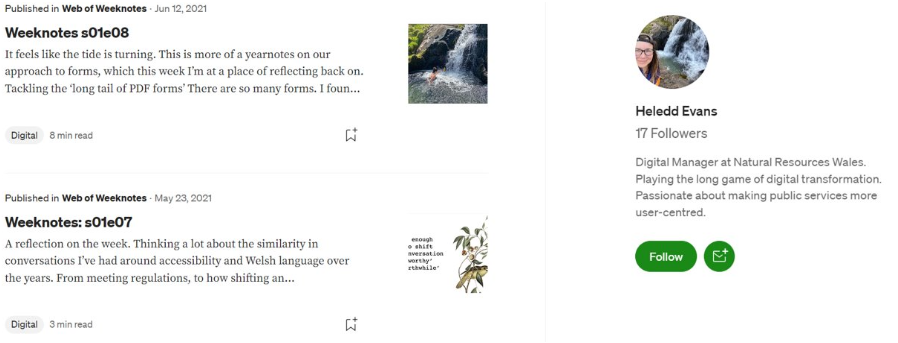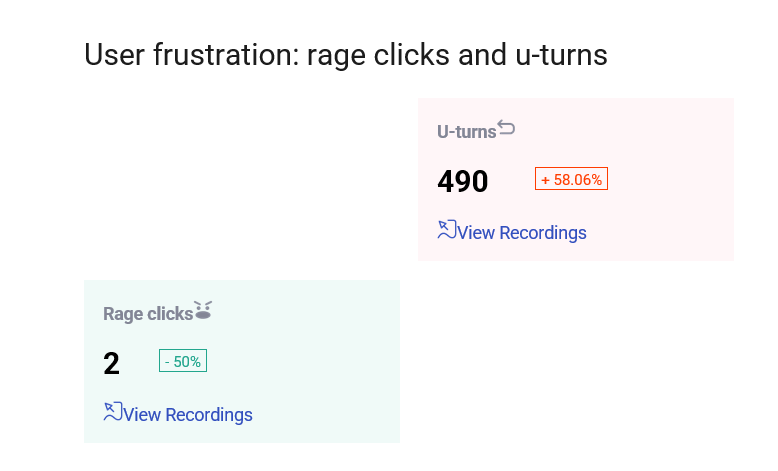Weeknotes 27/10/2023
It’s Halloween week coming up where our children (and adults) dress up as ghouls and enter the darker spirit of things at parties to enjoy some autumnal fun. We may not have any horror stories to tell you today (some cute ones) but be sure, we will voice our innermost experiences whilst working on the NRW website and intranet…and, some of them can be a little scary.
Why we should work in the open
This week Phil returned from his holiday (not another one, I hear you cry!). The holiday was lovely. I certainly think something is wrong with our weather though. My partner and I have been visiting the Canary Islands for many years in October, for some winter sun.

This was the first year we have ever had to use the air conditioning. Our first week on the island saw yet another temperature record broken on the Canary Islands. The temperature didn’t fall below 27.7 degrees Celsius, beating the previous record of 26.6 degrees for October in the historical records dating back to 1951. One evening at 2am, the temperature was still 33 degrees Celsius.
It’s off to work we go
I came back to work on Monday. Before I left work, many moons ago, I had a clear plan of what work I needed to do and what deadlines I needed to meet. On the Sunday before returning to work, I thought about the work and the deadlines once again, just to get things clear in my mind. I am a very organised person, and I cannot stand disorganisation, uncertainty, or faffing.
On Monday morning it turned out that what I thought I was working on and what I thought were the deadlines I should be meeting were in fact, “not for this week”. I’m not going to lie; this did play on my mind a bit. You start to doubt yourself, I started to doubt my organisational skills and in fact my skills in general, if I even really had any to begin with.
After much analysis, which I do very often, in fact too much sometimes. I concluded that despite all my hard work, and despite all my communication, that I hadn’t been clear enough. To date, I still think we don’t understand each other.
It’s all very well talking about what I am doing, but do they even understand me? Am I getting my message across clearly enough? Could I be like a scientist talking about the quantum vacuum to a room full of five-year-olds?
Therefore, I think working in the open is the way forward. I need to show what I have been working on, I need to show them what I mean, they need to see and visualise what the content and the structure of the content on our website will look like.
The benefits to working in the open
I’ve always believed that working in the open is a good thing.
It’s about:
- showing, not telling
- helping to build trust
- showing transparency
Showing, not telling
Working in the open is not about big presentations or spin. It’s about communicating in short, frequent updates what you have been working on.
It’s important to have control over showing what you have been up to, warts and all. Things will not and do not always go to plan and if you’re not used to working in this way, it can be scary.
Talking regularly about the work you have been doing increases the chances of getting everyone onboard with the task in hand.
It helps to build trust
Working in the open helps to build trust between everyone.
Showing what’s gone well and what hasn’t gone well, including the things we’re finding difficult goes a long way towards building trust.
A more collaborative approach increases empathy and understanding.
Showing transparency
Having regular opportunities to informally feed-back any concerns and flag things that may become a problem later, it’s very valuable. It means we are all less likely to spend too much time chasing something that isn’t right.
Our week notes
These week notes are a fine example of working in the open. We choose to put our authentic collective self out there and be vulnerable and visible, this week is no exception.
We are always looking for opportunities to get our work under the noses of people, beyond our immediate team. It takes time and we are constantly working on this.
In September of this year Heledd (Digital Services Team Leader), Sam (Content Designer) and Sophie (Digital Content Officer) from the digital team, had the opportunity to share our week notes with the Centre for Digital Public Services: Home Community of Practice for “working in the open”.
The team shared with the Centre for Digital Public Services some practical tips on how to start writing week notes:
- have one or two people to plan and inspire the team to get going
- set a rota for the coming three months
- pair up – no one has to weeknote alone
- don’t worry about structure – use a template or mix it up–it doesn’t matter
- commit to getting them published every Friday
- be honest and serious if you need to – some days and weeks are hard. Share that
- have fun. Share some jokes or quotes - let your readers get to know you and your team

Heledd started dabbling with weeknotes over three years ago (as a form of therapy in stressful weeks), but since then we’ve certainly matured and found our grove as a team.
Long live our weeknotes.
Frustration on our website
Soph has been very busy this week looking at; user feedback, content types, writing for specialists and reviewing evidence from our users. Based on user feedback, our website is not user-friendly, with lots of complicated pathways which eventually take users to the correct form or information they are looking for.
In just one week, nearly 500 users had to backtrack on themselves to navigate their way to the useful information.
Content needs to be published in a way that makes it easy for users to find.
We’re continuing to share our Content and publishing manual and raise awareness of good practice and hard rules. It’s our mission to make things easier for people to find, understand and use our website.
Users come to our website with a specific task in mind. They want to get it done as quickly as possible.
Our content types can help us decide:
- what the content is for
- where we publish it
- how we publish it
- writing clearly
All content published on the NRW website must follow our:
- style guide
- guidelines on writing for the web
Writing for specialists
Research shows that higher literacy people prefer plain English because it allows them to understand the information as quickly as possible. People understand complex specialist language, but do not want to read it if there’s an alternative. This is because people with the highest literacy levels and the greatest expertise tend to have the most to read.
Service design in practice alumni session
Laura, Lucinda and Sam did a show and tell for the Service Works Service Design in Practice alumni group.
Speaking about the permissions project they’ve been working on since January, they highlighted what approaches they’d used to help make the project go well - and how they were tackling challenges.
Topics included:
- understanding the service
- getting senior management buy-in
- sustaining good relationships with the admin team
- delivering small and fast
- measuring success
- managing expectations
- being slowed down
Service Works will be publishing the recording and a blog of the session soon.
Education audit
There’s been an increase in content requests from the education team recently and they are keen to publish on Umbraco themselves. Alex and Laura met with the team a few weeks ago to find out more and explain how we work etc.
After a few conversations and emails, we agreed to audit the education pages. The team also set up an enquiries log so we can see what people want to know. The data backs up what we had assumed (and what we often see across the site). There’s too much content and people can’t find what they’re looking for. They often end up contacting the team instead. The biggest hotspot on most pages is the link to the team email address.
We also learnt:
- education resources are really popular
- people want to know about training courses and school visits but there’s no info on the site
- there’s lots of content that doesn’t seem to have a purpose
- the content is hard to read
Laura has started mocking up test pages of how things look. Sticking to the ‘make a thing and show the thing’ mantra.
In the short term we want to remove content, improve page titles, add tables with our training course. Make the resources easier to find and link up with the permissions project to work on something for people who want to arrange education trips on land we manage.
We’re hoping the team will be on board with our initial ideas, but as always, we expect things will change and develop as we learn more.
Other things we’ve been doing this week:
- Alex has agreed a new process where user feedback is gathered on the NRW website and the user requires a response the digital team will forward to NRW’s customer team to respond. This should improve our service to users ensuring contacts are logged and responded to within SLA etc. The digital team will still be able to store and review the feedback for future user needs.
Friday Cute Fact

Did you know a group of otters is called a ‘romp’? This is due to their playful nature!
